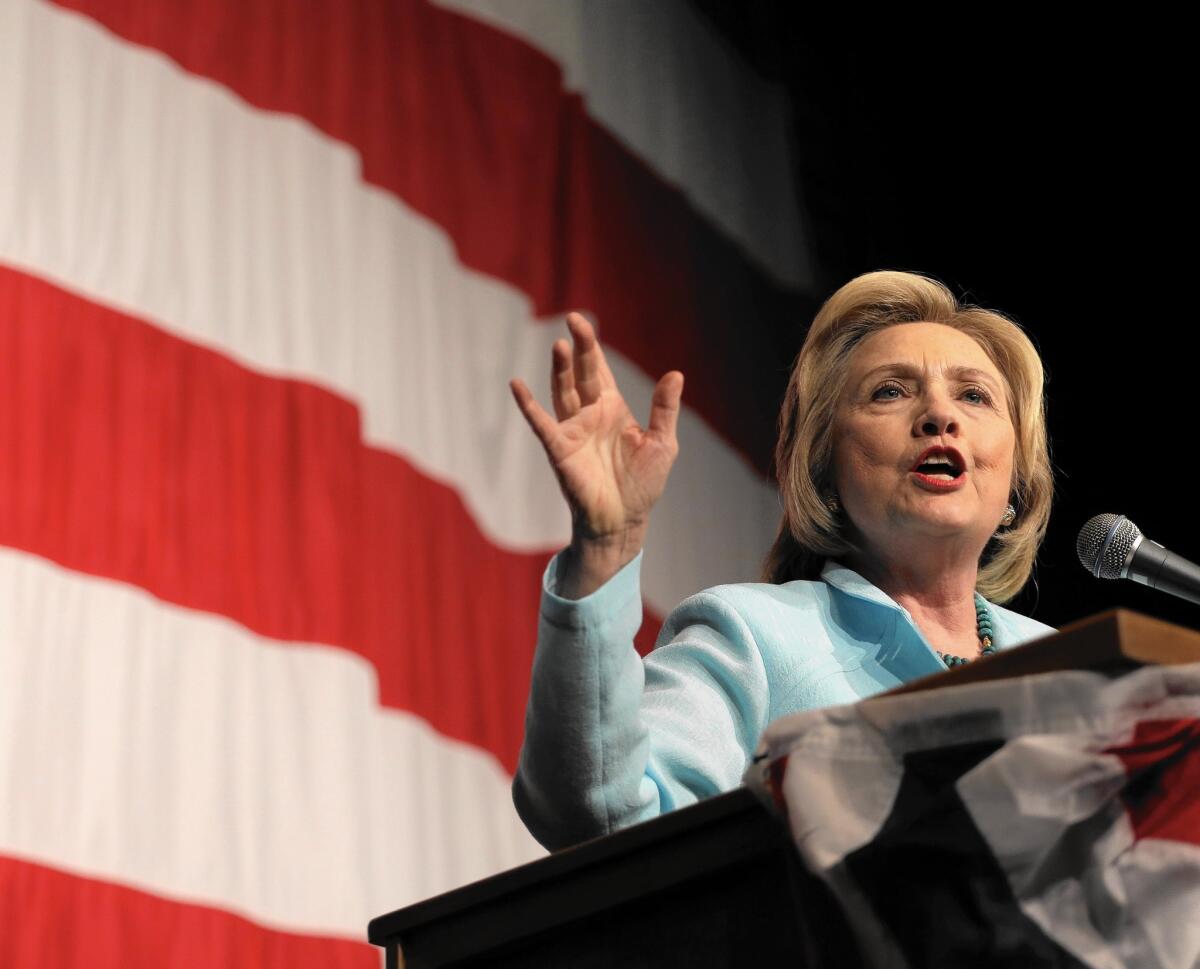Op-Ed: Why Clinton’s email problem won’t go away

Democratic presidential candidate Hillary Rodham Clinton speaks at the Iowa Democratic Wing Ding in Clear Lake, Iowa on Aug. 14.
- Share via
Hillary Rodham Clinton’s effort to quash the rising scandal over her misuse of email when she was secretary of State has so far backfired spectacularly. Instead of cutting the story short, she has fanned the flames, and now even some of her backers in the Democratic Party are worried about the trajectory of this drama, which threatens to derail her presidential candidacy.
For readers who’ve mostly ignored emailgate — assuming it would disappear — and now feel the need to catch up, here’s a primer on why it matters.
It’s difficult to avoid the suspicion that Clinton, after the scandals that rocked her husband’s presidency during the 1990s, simply did not want to leave behind a paper trail (or e-trail). And so, as secretary of State, she tried to skirt federal records law by employing her own IT systems and servers, and by exclusively using a personal email address.
This maneuver, however, created a far bigger problem than the one she intended to avoid, because a large portion of what any secretary of State does is classified to some degree. High-level diplomacy is inherently a secret matter and always has been.
Clinton partisans, betting on the public’s ignorance in these matters, have argued that the federal government over-classifies intelligence, and that this is therefore no big deal. Allow me to shed some light.
It is true that deciding what is unclassified versus confidential, the lowest level of government classification, can be subjective. Similarly, the line between what’s considered confidential versus secret, the next highest classification level, can get blurry. But top secret information, the highest classification level, is an entirely different matter.
After inspecting just 40 “unclassified” emails that Clinton provided to investigators, the Office of the Inspector General of the Intelligence Community determined that two of them should have been designated top secret/special intelligence. They contained information based on intercepted foreign communications, and included what spies call “sources and methods.”
In case it isn’t obvious from the label, that doesn’t mean scheduling details — whom the secretary of State met for lunch, for instance. A “source” could mean a human spy; a “method” could mean data hacking. We don’t want foreign countries to discover these particulars.
It’s no wonder that U.S. spy agencies are angry about this security breach, because it’s their data that Clinton staffers mishandled.
But it gets worse. Because top secret information travels on entirely separate systems throughout the federal government, it is virtually impossible that a Clinton staffer blithely or unknowingly pasted a top secret paragraph into an unclassified email.
On the contrary, it seems increasingly likely that Clinton’s staff was engaged in a systematic effort to take details off classified IT systems and strip them of proper classification markings (every paragraph in an intelligence report is classified separately) before sending them out electronically. This was not only a violation of numerous federal regulations, but also a crime — a felony when it involves top secret information.
Many difficult questions now present themselves, and presumably the FBI is asking them. Did Clinton staffers in the State Department violate federal laws systematically and independently? If not, who told them to do this?
Clinton has trotted out a range of excuses, none of which hold much water for anybody familiar with federal classification realities. Even if Clinton was only the recipient, not the sender, of top secret information, she should have reported the problem at once.
Everybody who obtains top secret/special intelligence clearances — pretty much every senior official inside the Beltway and most of their personal staffs — receives training in the handling of this valuable information.
Most worrying is the fact that, for several months, Clinton’s personal server was wholly unencrypted. Given the high value of any secretary of State — the world’s top diplomat — to dozens of foreign intelligence agencies worldwide, it’s a safe bet that Russian and Chinese spies were reading her correspondence.
Secretary of State John F. Kerry recently acknowledged that he assumes those countries are reading his unclassified emails. And only a decade ago, Russian intelligence got caught planting a bug in State Department headquarters, just down the hall from the secretary’s office. Moscow and Beijing may know more about Clinton’s activities at Foggy Bottom than Congress ever will.
This scandal isn’t going away anytime soon. Investigators have examined only one-fifth of the emails that Clinton handed over to them, so the true number of her “unclassified” emails that were actually classified may be in the thousands. Although it’s premature to discuss prosecutions, Clinton’s staff may well have engaged in conduct that lands less exalted citizens in prison.
John R. Schindler is a security consultant and a former National Security Agency counterintelligence officer. He is on Twitter at @20committee.
Follow the Opinion section on Twitter @latimesopinion and Facebook
More to Read
A cure for the common opinion
Get thought-provoking perspectives with our weekly newsletter.
You may occasionally receive promotional content from the Los Angeles Times.










